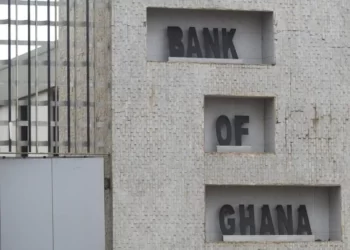The Ghana Stock Exchange (GSE) closed Thursday’s trading session on a mixed note, marked by declines in both trading volume and turnover, as investor sentiment appeared cautious.
The market recorded a total of 506,700 shares traded, corresponding to a market value of GHS 1,631,458.37, representing a 12% decline in volume and a 10% drop in turnover compared to the previous trading day on Wednesday, November 5.
While trading activity moderated, only one stock managed to post gains—Clydestone Ghana Limited—whose share price appreciated by 8.33% to emerge as the day’s standout performer. On the flip side, Ecobank Transnational Incorporated (ETI) suffered a 9.09% drop, making it the sole loser of the session and a key driver of the day’s market weakness.
Clydestone Ghana, an indigenous IT and financial technology company listed on the GSE, proved to be the session’s bright spot. The firm’s 8.33% share price jump stood in sharp contrast to the broader market’s bearish tone. Analysts believe Clydestone’s upward momentum may have been supported by renewed investor confidence in the company’s digital payment services and software solutions, which have positioned it as a strategic player in Ghana’s fintech ecosystem.
Market watchers suggest that Clydestone’s resilience could signal growing investor appetite for technology-driven stocks, particularly in an era where financial digitization and payment innovation are gaining traction across West Africa.
Ecobank’s Decline Pulls Market Down
In contrast, Ecobank Transnational, one of the market’s most heavily traded financial stocks, faced significant downward pressure, shedding 9.09% of its value by the end of trading. The decline in ETI’s share price weighed heavily on the GSE Financial Stocks Index (GSE-FSI), which dropped 1.79% to close at 4,186.82 points.
The banking sector has recently been characterized by cautious trading, as investors assess liquidity positions, capital adequacy, and exposure to macroeconomic uncertainties in the subregion. ETI’s decline reflects this broader sentiment, with investors possibly engaging in profit-taking after recent gains in financial equities.
Despite the dip, the GSE-FSI still maintains a year-to-date gain of 75.86%, underscoring the resilience of financial sector stocks throughout 2025.
Market data shows that MTN Ghana continued to dominate trading activity with 160,461 shares exchanged, followed by CalBank with 119,036 shares, Societe Generale Ghana with 78,113 shares, and Ecobank Transnational with 70,930 shares. These four equities accounted for the bulk of trading volume, highlighting sustained investor interest in both the telecommunications and banking sectors.
The strong showing by MTN Ghana in volume terms reflects its attractiveness as a defensive stock, given its consistent dividend payments and strong market fundamentals. However, the overall decline in market turnover suggests that institutional investors may have adopted a wait-and-see approach amid ongoing market volatility.
Market Indices Reflect Mixed Performance
The benchmark GSE Composite Index (GSE-CI), which tracks the performance of all listed equities, fell by 54.42 points (-0.66%) to close at 8,227.84 points. This marks a 1-week loss of 1.37% and a 4-week loss of 3.17%, signaling short-term bearishness in the market.
However, on a broader scale, the index still reflects optimism, with a year-to-date gain of 68.31%. This impressive annual performance highlights the GSE’s relative strength in 2025, supported by strong corporate earnings, improved macroeconomic stability, and growing investor confidence.
Despite the current slowdown, analysts remain upbeat about the market’s medium-term prospects, citing Ghana’s declining inflation rate, improved foreign exchange stability, and ongoing fiscal reforms as catalysts for a rebound in equity valuations.
Despite the day’s decline in trading activity and index performance, the total market capitalization of the Ghana Stock Exchange remained relatively stable at GHS 163.1 billion. The sustained market value reflects continued investor participation and confidence in Ghana’s listed companies, particularly those in the telecommunications, banking, and consumer goods sectors.
According to market experts, the GSE’s market capitalization has benefited from increased listings, improved corporate disclosures, and stronger regulatory oversight from the Securities and Exchange Commission (SEC) and the Ghana Stock Exchange. These developments have enhanced the credibility of the local bourse, attracting both domestic and foreign investors.
Market analysts believe the current pullback may be temporary, as investors reassess portfolio allocations in response to changing macroeconomic indicators and quarterly corporate earnings. While the recent declines in volume and turnover indicate a slowdown in market participation, the strong year-to-date performance across key indices suggests that the GSE remains a profitable frontier market.
In the coming weeks, investor attention is expected to focus on third-quarter financial reports from listed companies, which could provide fresh momentum for stock prices. Sectors such as telecommunications, finance, and consumer goods are likely to remain key drivers of market activity.
Moreover, with the GSE pushing for digital trading platforms and broader retail participation, analysts anticipate a gradual recovery in volumes as more investors return to the market in anticipation of year-end rallies.
As the market navigates short-term volatility, investors are urged to maintain a long-term view, focusing on companies with solid earnings potential and sound fundamentals. The day’s outcome underscores the dynamic nature of Ghana’s capital markets—where resilience and opportunity continue to coexist even amid fluctuations.
READ ALSO: Ghana Revenue Authority Unveils Aggressive Plan to Add GH¢10 Billion to Domestic Revenue























